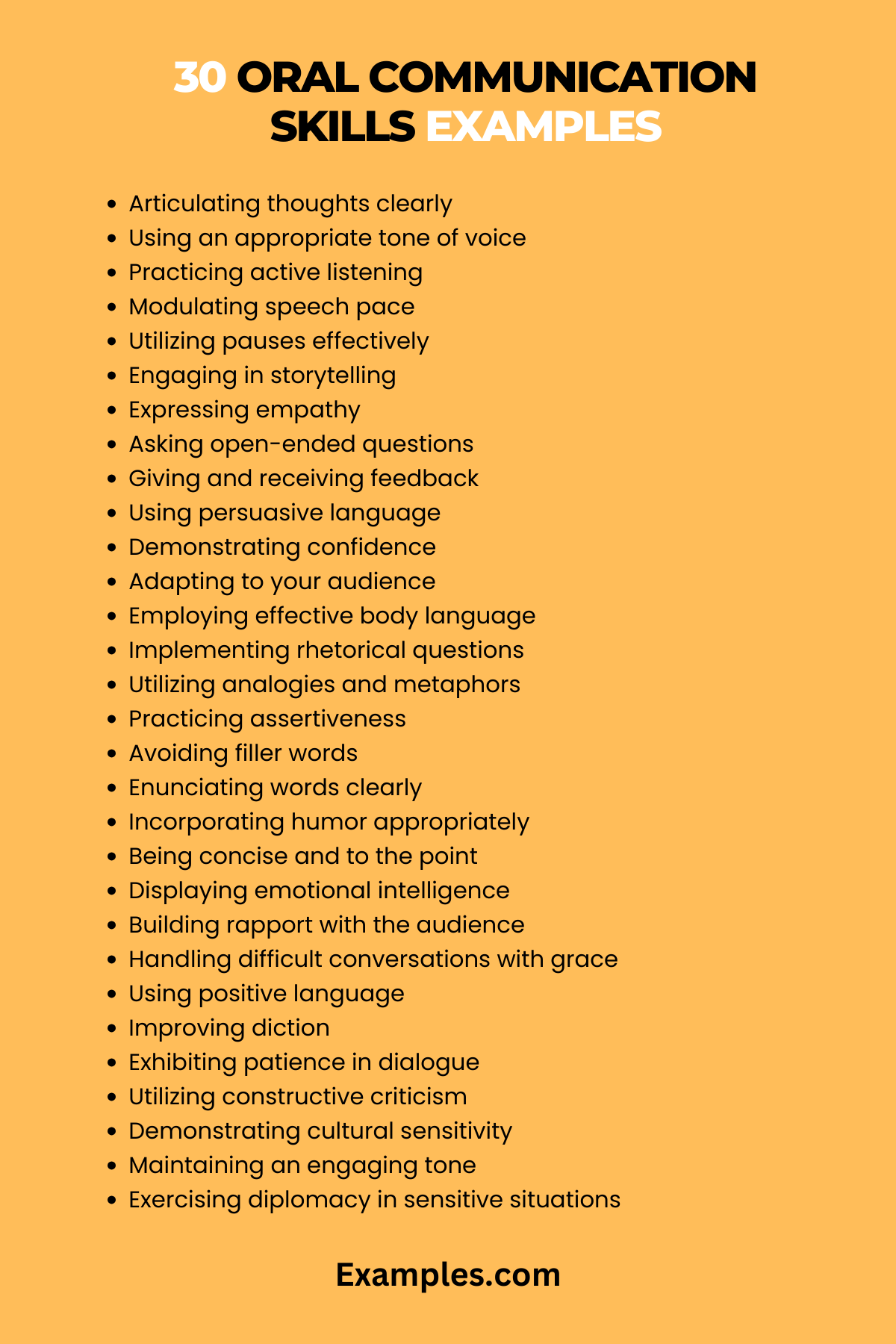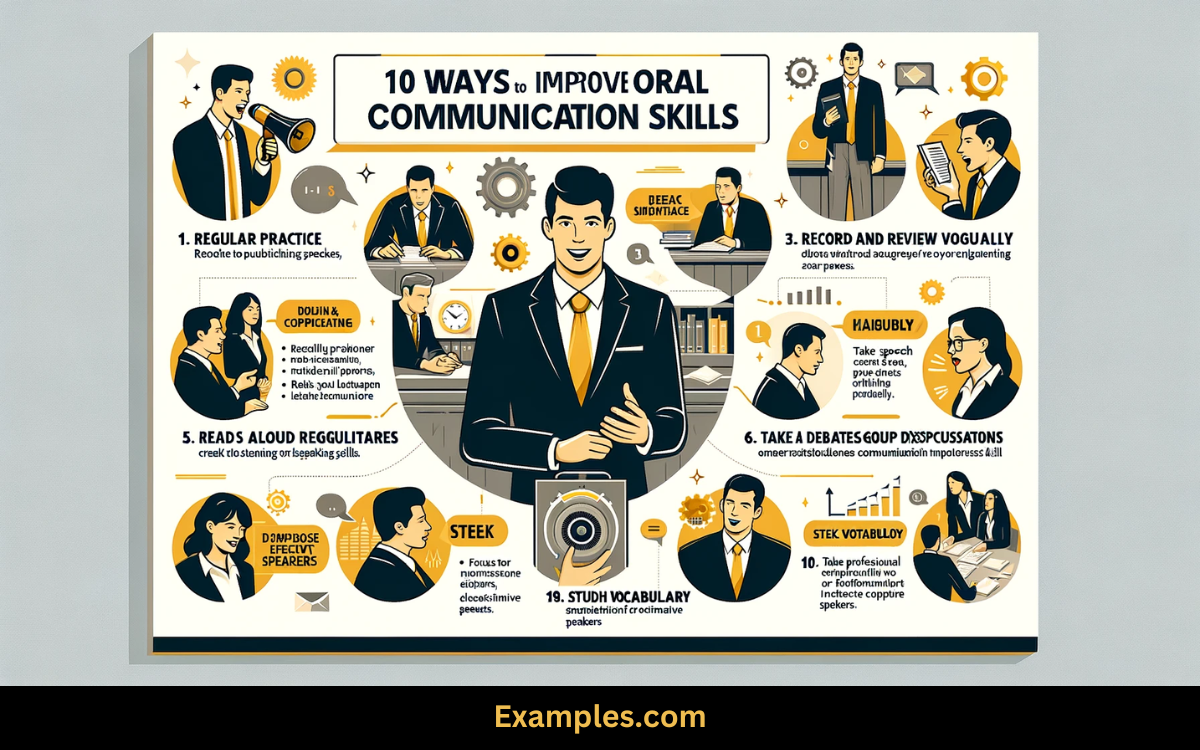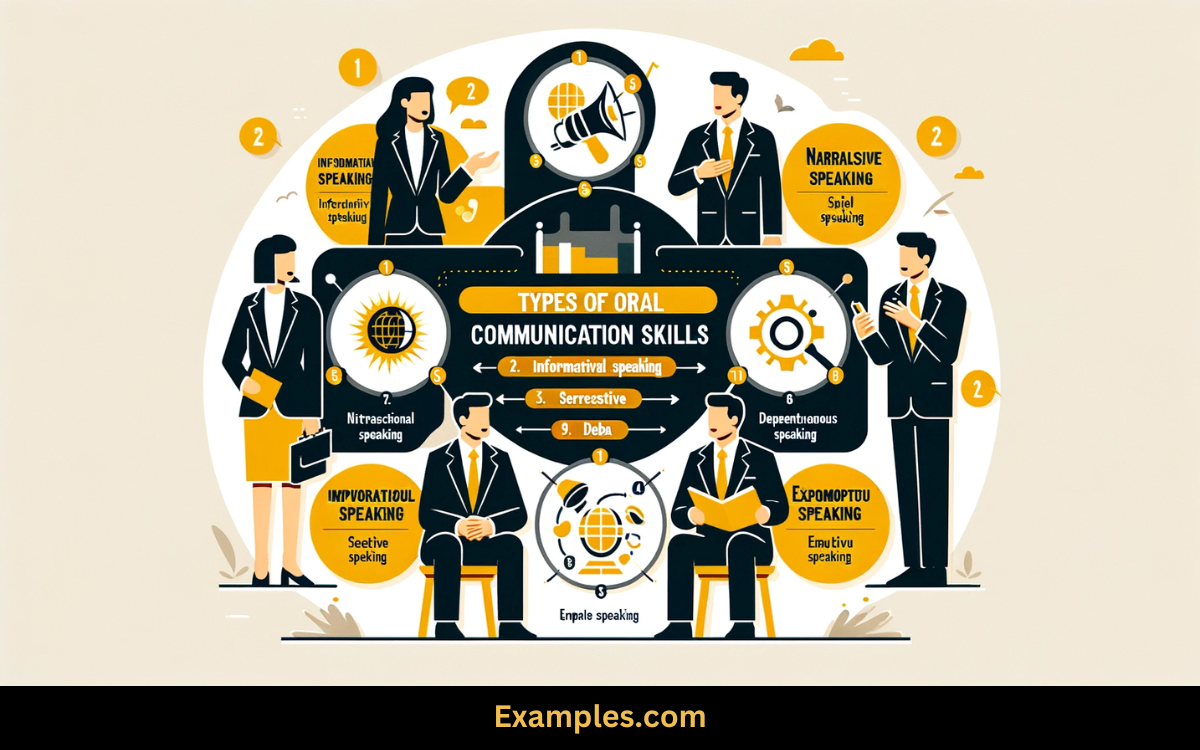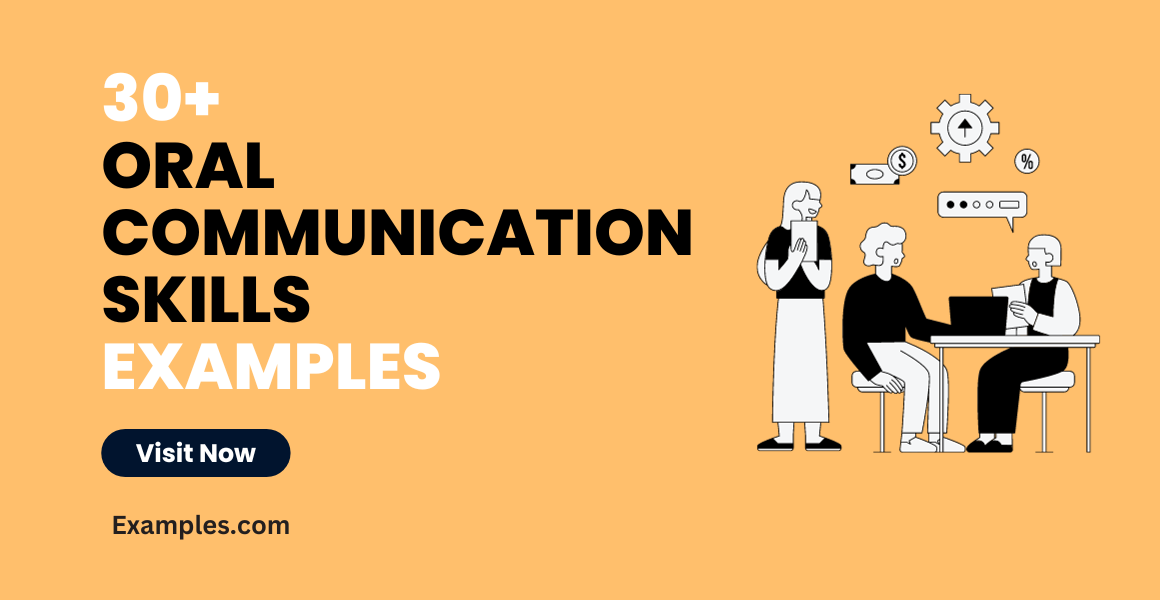29+ Oral communication skills Examples
Navigate the intricate world of Oral Communication Skills with our comprehensive guide, enriched with practical sentence examples. This guide delves deep into the art of verbal expression, highlighting various communication examples that you encounter daily. From professional presentations to casual conversations, we cover the spectrum of scenarios, offering insights and techniques to enhance your articulation and persuasive abilities. Whether you’re a student, professional, or anyone looking to improve their speaking skills, this guide serves as an invaluable tool for mastering the nuances of effective oral communication.
30 Oral Communication Skills Examples
Embark on a journey through 30 key Oral Communication Skills, each uniquely designed to enhance your verbal interactions. This collection showcases a wide array of techniques, from persuasive speaking to empathetic listening, essential for various communication settings. Whether in professional environments, educational contexts, or personal relationships, these skills are pivotal for effective and impactful communication. Accompanying each example is a brief explanation, demonstrating how to implement these skills in real-life scenarios. Ideal for individuals aiming to refine their speaking abilities, this guide serves as a practical tool for developing a strong, confident, and persuasive communication style.

- Articulating thoughts clearly Express ideas in a straightforward and understandable manner. Focus on clarity and simplicity to ensure your message is comprehended.
- Using an appropriate tone of voice The tone conveys emotions and intentions. Adjust your tone to suit the context and audience.
- Practicing active listening Listening actively shows respect and understanding. Nod, maintain eye contact, and give feedback to demonstrate engagement.
- Modulating speech pace The speed of speech affects comprehension. Slow down for complex topics and speed up for excitement or urgency.
- Utilizing pauses effectively Pauses can emphasize points or give time to think. Use strategic pauses to enhance your message’s impact.
- Engaging in storytelling Stories make your communication relatable and memorable. Incorporate relevant stories to connect with your audience.
- Expressing empathy Empathy builds trust and connection. Use empathetic language to show understanding of others’ perspectives.
- Asking open-ended questions Open-ended questions encourage detailed responses. Phrase questions to elicit more than a yes/no answer.
- Giving and receiving feedback Feedback is crucial for growth and improvement. Offer constructive feedback and be open to receiving it.
- Using persuasive language Persuasion is key in many interactions. Employ rhetorical techniques like ethos, pathos, and logos.
- Demonstrating confidence Confidence makes you more persuasive. Maintain good posture and speak assertively to convey confidence.
- Adapting to your audience Tailor your message to the audience’s needs. Alter your language, tone, and content based on the audience.
- Employing effective body language Non-verbal cues complement your words. Use gestures and facial expressions to reinforce your message.
- Implementing rhetorical questions Rhetorical questions engage the audience’s thoughts. Pose questions to provoke thinking or emphasize points.
- Utilizing analogies and metaphors These add depth and understanding to your points. Use analogies to make complex ideas more relatable.
- Practicing assertiveness Assertiveness ensures your voice is heard. State your opinions respectfully but firmly.
- Avoiding filler words Fillers can undermine your credibility. Practice speaking fluently to eliminate “um,” “ah,” and “like.”
- Enunciating words clearly Clear pronunciation aids understanding. Focus on articulating each word, especially in important communications.
- Incorporating humor appropriately Humor can lighten the mood and engage. Use humor wisely to enhance, not distract from, your message.
- Being concise and to the point Brevity ensures attention and retention. Keep your messages brief and relevant to maintain interest.
- Displaying emotional intelligence Understanding emotions aids in effective communication. Be aware of and respond appropriately to emotional cues.
- Building rapport with the audience Rapport creates a connection. Find common ground and show genuine interest in your audience.
- Handling difficult conversations with grace Difficult topics require sensitivity. Approach tough subjects with tact and consideration for others’ feelings.
- Using positive language Positive wording fosters a better response. Phrase things positively to encourage and motivate.
- Improving diction Good diction enhances clarity. Work on pronunciation and choice of words for clearer communication.
- Exhibiting patience in dialogue Patience prevents misunderstandings. Give others time to speak and process information.
- Utilizing constructive criticism Constructive criticism promotes growth. Phrase critiques in a way that is helpful, not hurtful.
- Demonstrating cultural sensitivity Be mindful of cultural differences. Adapt your communication style to respect diverse backgrounds.
- Maintaining an engaging tone A monotonous tone can disengage listeners. Vary your tone to keep the audience interested.
- Exercising diplomacy in sensitive situations Diplomacy is key in delicate contexts. Communicate with tact and sensitivity to maintain harmony.
10 Ways to Improve Oral Communication Skills
Enhancing your Oral Communication Skills is crucial for both personal and professional growth. This guide offers ten innovative and effective strategies to refine your speaking abilities. Each method is tailored to help you communicate more clearly, confidently, and persuasively. From improving your listening skills to mastering the art of non-verbal communication, these techniques are designed to transform the way you interact with others. Whether you’re preparing for a big presentation, a job interview, or simply looking to be more articulate in daily conversations, these tips will provide valuable insights for improving your oral communication skills.

- Regular Practice Frequent speaking opportunities build confidence and fluency. Seek out public speaking clubs or practice with friends and family.
- Engage in Public Speaking Workshops Workshops offer structured learning and feedback. Join local or online public speaking groups to learn from experts.
- Record and Review Your Speeches Self-analysis helps identify areas for improvement. Record your presentations and note areas where you can improve pacing, tone, and clarity.
- Read Aloud Regularly Reading aloud improves diction and expression. Set aside time daily to read a book or article aloud, focusing on clear articulation.
- Participate in Debates or Group Discussions Debates enhance quick thinking and effective articulation. Join a debate club or group discussions to practice formulating and expressing opinions clearly.
- Focus on Listening Skills Good listening leads to better responses. Practice active listening in conversations to understand and respond more effectively.
- Expand Vocabulary A rich vocabulary allows for clearer expression. Learn new words daily and incorporate them into your conversations and speeches.
- Take Professional Speech Lessons Professional training can offer personalized guidance. Consider hiring a speech coach or attending speech classes to refine your technique.
- Seek Constructive Feedback Feedback from others is invaluable. After speaking, ask for honest critiques from your audience or peers.
- Study Effective Speakers Learn from skilled communicators. Watch speeches or presentations by accomplished speakers to observe and adopt effective techniques.
Types of Oral Communication Skills
Oral communication skills are diverse and cater to various interaction needs and contexts. This guide explores different types of oral communication skills, each playing a vital role in effective personal and professional interactions. From persuasive speaking to empathetic listening, these skills are essential for anyone looking to enhance their ability to communicate effectively. Understanding and mastering these various types of oral communication skills can lead to more successful conversations, presentations, and relationships, both in personal and professional settings.

- Informative Speaking This involves providing information clearly and accurately. Focus on presenting facts and data in a structured and understandable way.
- Persuasive Speaking Aimed at influencing the audience’s beliefs or actions. Use compelling arguments, evidence, and rhetorical techniques to persuade.
- Instructional Speaking Giving instructions or directions clearly. Be concise and clear, using step-by-step explanations.
- Narrative Speaking Telling a story or recounting events. Engage the audience with vivid descriptions and a coherent storyline.
- Motivational Speaking Inspiring and encouraging the audience. Use uplifting language and powerful anecdotes to motivate.
- Ceremonial Speaking Speaking at events like weddings or graduations. Incorporate appropriate sentiments and maintain a tone suitable for the occasion.
- Debative Speaking Arguing a point in a formal or informal setting. Present well-structured arguments and counterarguments effectively.
- Extemporaneous Speaking Speaking without extensive preparation. Rely on your knowledge and adaptability to communicate ideas spontaneously.
- Impromptu Speaking Unplanned or unrehearsed speaking. Stay calm and use your quick thinking to deliver coherent thoughts.
- Emotive Speaking Expressing emotions and feelings verbally. Be genuine and use emotional intelligence to connect with the audience.
Oral Communication Skills for Students
Developing Oral Communication Skills is a crucial aspect of a student’s educational journey. This guide focuses on ten vital oral communication skills specifically tailored for students. These skills are essential not only for academic success but also for personal growth and future professional interactions. From delivering presentations to participating in class discussions, mastering these skills can significantly enhance a student’s ability to express ideas effectively, engage in meaningful conversations, and confidently present their thoughts and knowledge.

- Classroom Presentations Delivering clear and engaging presentations. Organize content logically and practice to ensure smooth delivery.
- Group Discussion Participation Actively contributing to group conversations. Listen attentively and share thoughts in a respectful and clear manner.
- Debate Skills Articulating points in a structured debate setting. Develop arguments and counterarguments with evidence and clear reasoning.
- Peer-to-Peer Communication Interacting effectively with fellow students. Use clear, respectful language and active listening in peer interactions.
- Questioning Techniques Asking relevant and thoughtful questions. Frame questions that provoke discussion and deepen understanding of the topic.
- Feedback Articulation Giving and receiving constructive feedback. Communicate feedback in a positive, constructive manner and be open to receiving it.
- Public Speaking Speaking confidently in front of an audience. Practice speaking loudly and clearly, using notes as a guide, not a script.
- Interview Skills Effectively communicating in interviews. Prepare answers to common questions and practice speaking in a confident, concise manner.
- Academic Discussion Skills Engaging in scholarly conversations. Use formal language and back up points with academic references or logical reasoning.
- Persuasive Speeches Convincing others of a point of view. Use persuasive language, evidence, and emotional appeals to sway the audience.
How to Develop Oral Communication Skills in Students?
Developing Oral Communication Skills in students is pivotal for their academic and personal growth. This comprehensive guide outlines effective strategies educators and parents can implement to enhance students’ verbal communication abilities. By focusing on these skills, students can significantly improve their ability to articulate thoughts, engage in productive discussions, and present ideas clearly and confidently.
- Create a Supportive Environment Foster a classroom or home environment that encourages open communication. Make it a safe space where students feel comfortable expressing their thoughts without fear of judgment.
- Incorporate Group Activities Group discussions, debates, and team projects encourage students to articulate their ideas and listen to others. These activities teach students how to communicate effectively in a group setting.
- Role-Playing Exercises Role-playing can help students practice real-life communication scenarios. This method allows them to develop empathy and understand different perspectives.
- Public Speaking Opportunities Provide opportunities for students to speak in front of their peers. Start with small groups and gradually increase the audience size to build confidence.
- Teach Active Listening Skills Emphasize the importance of listening as part of communication. Teach students to listen attentively and respond thoughtfully.
- Encourage Participation in Extracurricular Activities Activities like drama, debate clubs, or public speaking competitions provide practical experiences that hone communication skills.
- Feedback and Reflection Offer constructive feedback on students’ communication efforts. Encourage self-reflection to help them identify areas for improvement.
- Use Technology as a Tool Leverage technology to engage students in various forms of communication, like creating video presentations or participating in online discussions.
- Model Effective Communication As educators and parents, demonstrate good communication skills. Use clear language, maintain eye contact, and show active listening.
- Incorporate Diverse Communication Forms Introduce students to different communication styles and cultural norms. This exposure helps them understand and adapt to various communication contexts.
Tips for Improving Your Oral Communication Skills
Improving Oral Communication Skills is essential for effective interactions in both personal and professional settings. This comprehensive guide offers practical tips to enhance your speaking abilities, making your communication more impactful and persuasive. Whether you’re a student, a professional, or someone looking to boost your everyday conversation skills, these strategies are designed to help you communicate more clearly and confidently.
- Practice Regularly: Like any skill, oral communication improves with practice. Engage in conversations, participate in public speaking events, or even practice speaking in front of a mirror.
- Listen Actively: Good communication isn’t just about speaking; it’s also about listening. Pay attention to what others say and respond appropriately. This builds rapport and makes conversations more meaningful.
- Expand Your Vocabulary: A rich vocabulary allows you to express yourself more precisely. Read widely and learn new words regularly to enhance your verbal expression.
- Be Clear and Concise: Avoid ambiguity in your speech. Aim to be clear and to the point, which makes it easier for your audience to understand and retain your message.
- Observe Non-Verbal Cues: Your body language, facial expressions, and gestures can significantly impact how your message is received. Ensure your non-verbal cues match your words.
- Receive and Implement Feedback: Constructive feedback is invaluable. Seek opinions from others about your speaking skills and work on the areas they suggest.
- Engage in Public Speaking and Debating: These activities provide a structured environment to practice and improve your speaking skills. They also help in building confidence.
- Record and Review Your Speeches: Recording your presentations and speeches allows you to observe and refine various aspects of your communication, such as tone, pace, and body language.
- Participate in Group Discussions: Group discussions offer a dynamic environment to practice articulating your thoughts clearly and confidently in a group setting.
- Stay Informed: Being knowledgeable about various topics enables you to participate in a wider range of conversations, which can significantly enhance your oral communication skills.



